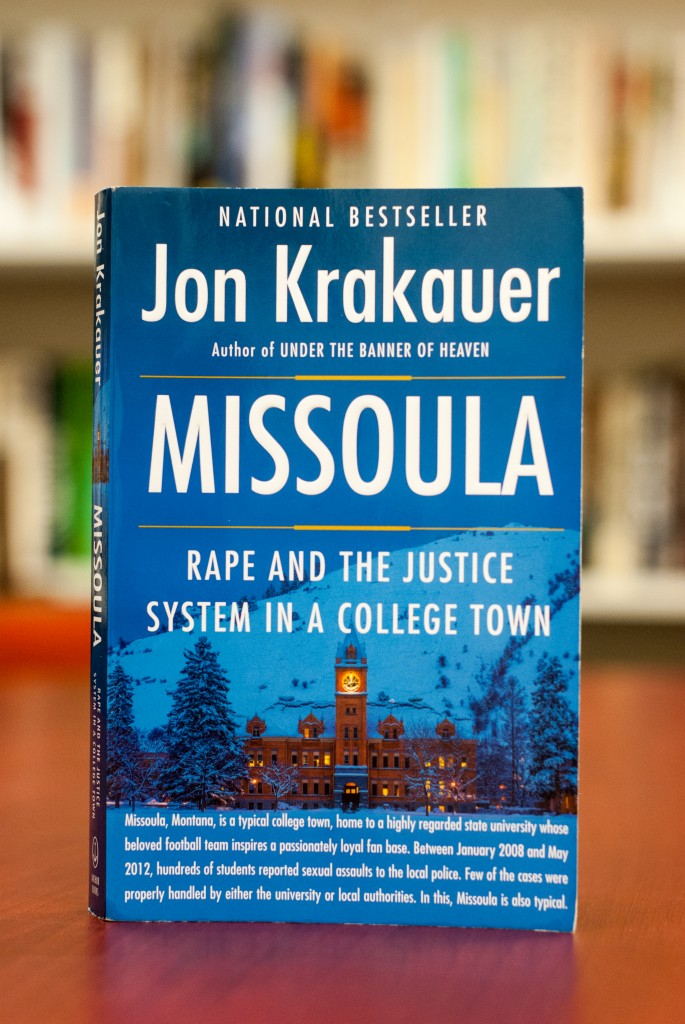Author Krakauer Tackles Sexual Assault In College Towns

“MISSOULA” EXPLORES HOW PROSECUTION OF RAPISTS CAN BE INEFFECTIVE AND NEEDS TO CHANGE
By Michaela Payne
Everyone should read this book or a book like it. Even if sexual assault hasn’t happened to you, it’s happened to many people you know.
Best-selling author Jon Krakauer’s “Missoula: Rape and the Justice System In A College Town,” is a chilling book about Missoula, Montana, where several sexual assault cases between students—terribly common in most college towns, Krakauer writes—were highly publicized in the news media.
Krakauer picks apart the lengthy process of prosecution that sexual assault survivors endure, which includes hostility from local residents and accusations of lying by legal defenders. Survivors hope to see their rapists punished so others may be spared from assault, but legal proceedings often lead to trials that force survivors to relive their traumas and sentence the rapists to only short terms in minimum-security jails. Colleges like the University of Montana can only attempt to expel the perpetrators.
Often, nothing happens. Rapists go free, assault more people and leave a trail of victims who (conveniently for the rapists) tend to blame themselves, shut out their memories and never feel safe again.
Krakauer’s book, published in 2015, follows several survivors through reporting the assault, healing from trauma, and pressing charges against their attackers at the college and through the legal system. He includes each survivor’s opinions about how her case was handled. He interviewed cops, witnesses, deans, lawyers and many survivors, and presents these firsthand stories without doubting survivors’ honesty or motives.
Though one in five college students is sexually assaulted, fewer than five percent ever report it.
In “Missoula,” as in his previous books, Krakauer writes about people who endure through extreme hardship. But this is the first time his nonfiction work has featured central female characters, like in “Where Men Win Glory: The Odyssey of Pat Tillman” (2009) about an NFL star from San Jose, California, who quit pro football to join the U.S. Army, and “Into The Wild” (1996) about a young adventurer who met his death on a backpacking journey in the Alaskan wilderness.
In this book, many of the alleged rapists are young men who play college football with the University of Montana’s Grizzlies, who have a fanatic local following. Krakauer tells how fans and even some legal counsel gave the accused much public support while spreading misconceptions about their victims, like that the women invented rape stories for attention, invited sexual advances and behaved promiscuously, to discredit them and undermine their allegations.
In San Francisco and throughout the state, lawmakers and educators are making efforts to address the ineffective systems currently in place for handling and preventing sexual assaults.
Though one in five college students is sexually assaulted, fewer than 5 percent ever report it. In September last year, San Francisco public and private colleges agreed to an initiative to increase the rates that sexual assault survivors report the crimes, and to increase their access to aid.
These efforts follow two 2014 California senate bills requiring California institutions to create policies that ensure sexual assault and other hate crimes are promptly reported to law enforcement (Assembly Bill 1433) and to require affirmative consent for consensual sex.
Instead of “no means no,” which limits legal action if the assaulted was intoxicated, in shock, or otherwise unable to adequately say no to sex, Senate Bill 967 requires clear consent or “yes means yes.”
At the press conference in the fall, Supervisor Jane Kim spoke about feeling hopeless in college when her best friend was assaulted. Kim didn’t encourage reporting it, which is not unusual. “Even at 18 I knew the system wasn’t designed to protect us,” Kim said.
Through Krakauer’s reporting, this system failure becomes quite clear. Some survivors who reported their assault had their private lives rifled through and publicized in the Missoula court and University of Missoula campus hearings, but Krakauer’s presentation of facts may encourage more people to come forward and force the system to reform.
Krakauer presents the survivors’ stories with empathy and also bias: he favors justice for the injured. His writing is vivid and clear, but the stories and his accounts of the frustrating legal process are painful to read. Overall, he demonstrates that people should report assaults to save others from suffering the same fate, and should act against the legal and cultural factors that allow sexual violence.
Most of the stories in “Missoula” are about female college students who were sexually assaulted by male athletes, but sexual assault claims a much wider scope of victims. Krakauer’s narrow focus allows him to unearth the darkest parts of one example, but socially and legally addressing the larger issue will require more voices from more perspectives.
Contact a reporter
Send an email to: Michaela Payne

Comments are closed.